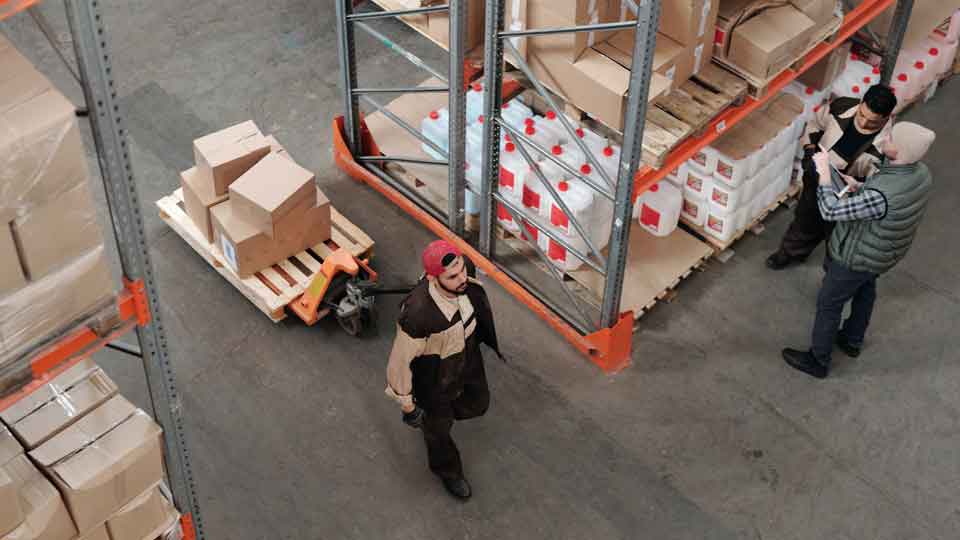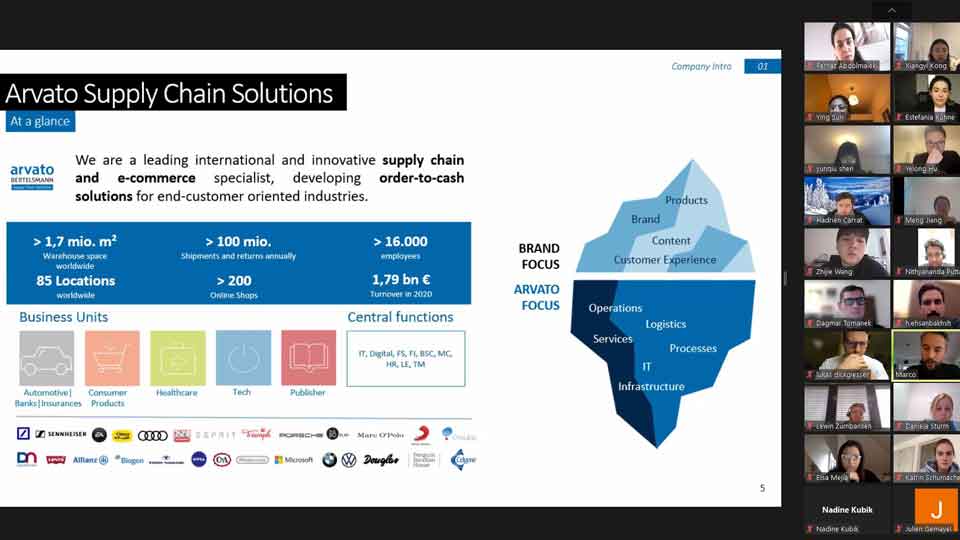Careers in logistics

In short, if you work in logistics, you make sure customers worldwide receive their products without delay, thus ensuring everything is working as it should be – supermarket shelves are fully stocked, orders arrive on schedule and firms continue to produce at full capacity. Logistics management focuses on optimizing these processes and developing strategies to meet new challenges.
What careers are there in logistics?
There is more to logistics than you think. The occupational field can be divided into three categories:
1. Logistics
In logistics, you plan and execute the efficient transportation and storage of goods. This includes, for example, cooperating closely with forwarding companies and suppliers and preparing contracts and tenders.
According to the expert: „Digitalization has made an increasing number of office tasks obsolete," explains ISM Professor Dr. Dagmar Tomanek. "In today's professional practice, it's essential that logisticians go directly to the warehouse to solve problems and to get an overview of the relevant processes.“
2. Supply chain management
As a supply chain manager, you are in charge of the entire supply chain, including suppliers, distribution partners and, in particular, customers. They also increasingly expect all essential and additional services related to the product to be provided as effective and efficient tailored solutions. At the same time, your role includes optimizing the supply chain to ensure all goods end up in the right place at the right time in the most cost-effective manner. To achieve this goal, you also need to be completely familiar with all the various functional areas of your firm, understand their respective requirements and perspectives, and ensure smooth cooperation between all of them at all times.
According to the expert: ISM Professor Dr. Christoph Feldmann: „We like to compare the supply chain manager to a conductor: For instance, a conductor doesn't have to be able to play every instrument in the orchestra, but he or she does need to understand each one and make sure they all fit together perfectly.“
3. Purchasing
In purchasing, your task is to procure goods, i.e. you order everything the company needs, from raw materials for production to office supplies.
According to the expert: “A key part of the job is to identify the best partners worldwide and to get them to work closely and long term with your firm and to draft contracts in such a way that all requirements are implemented safely and both current and future demands are met. If just one component is missing, an entire industry may come to a grinding halt, as is the case with the current shortage of microchips in the automotive industry. Conversely, excessive procurement and production leads to unnecessary high costs, a waste of resources and environmental degradation, as is often the case in the fashion industry, for example,“ explains Prof. Dr. Feldmann.

On the whole, you play a very important role as a logistics specialist. In fact, Prof. Dr. Feldmann believes this is the career that will have the greatest strategic impact within a company in the future. „Today, more than half the value added is created outside the boundaries of a company with supply chain partners, and this is only set to increase in the future. Innovations are also no longer necessarily developed by a company's R&D staff, as know-how and new technologies are also increasingly purchased from external partners. And this obviously requires someone who is well acquainted with and can coordinate the needs of their own company as well as the current and future demands of their customers and suppliers.“
What do you need for the job?
In the field of logistics, you will face new and different challenges every day. If you are going to make a success of your role and recognize opportunities, you should be someone who enjoys solving problems and thinking outside the box. Dr. Nadine Kubik, who is responsible for the ASPIRE Logistics Management Trainee Program at Arvato Supply Chain Solutions, places great emphasis on ensuring that each year's applicants have the skills needed for their future roles as logistics managers and project managers: „Besides the theoretical aspects provided by their degree courses, we also make sure that our trainees have excellent analytical skills. The ability to imagine logistics processes, even in the abstract, is crucial for optimizing warehouse performance, for example. It's also essential that the candidates have a certain hands-on mentality. When interviewing young graduates, we're always impressed by candidates who are eager to make a difference and contribute to their personal strengths. Over the Christmas period, from around November to January, when the volume of deliveries increases significantly, it's also helpful to be able to cope with stress and keep a cool head when things get busy.“

If you decide to complete a Master's degree, for example in International Logistics & Supply Chain Management, you do not necessarily need to have a Bachelor's degree in logistics. „A background in business administration, engineering, the natural sciences or computer science is also ideal,“ explains Prof. Dr. Feldmann. „A basic understanding of technical issues is always useful.“
Furthermore, a career in logistics is definitely something for globetrotters who enjoy working and interacting with various cultures and personalities and would relish the opportunity to live in different places around the world.
The work is highly international. In other fields, you might call yourself proficient if you're particularly knowledgeable in a certain domain. In the field of logistics, purchasing and, in particular, supply chain management, however, you'd say: You're not proficient until you've seen the whole world. The supply chain manager is, therefore, the strategically thinking all-rounder who is 'at home' around the globe.
Prof. Dr. Christoph Feldmann
How great is the demand for logisticians?
„Highly trained logisticians are definitely in demand at the moment,“ claims Dr. Nadine Kubik. „That's why we also aim to address students directly and to show them the array of entry-level opportunities at Arvato Supply Chain Solutions.“ Students on the ISM Master's degree course International Logistics & Supply Chain Management gained a deep insight into the world of logistics at an exclusive career workshop during which the ASPIRE trainee program at Arvato Supply Chain Solutions was presented. Over the course of the 18-month program, trainees have the opportunity to get to know the various departments at ASCS and also spend a period of time working abroad. The on-the-job training provides the trainees with the support they need for both their professional (e.g. project management) and personal (e.g. cross-cultural skills and leadership skills) development. A decision on which specific roles the trainees will subsequently hold is only taken once the program has been completed. „Such direct insights into professional practice are extremely valuable,“ says Prof. Dr. Feldmann. „Our students are thus well prepared for the career choices ahead of them.“

Careers in logistics of the future
„The future topics surrounding logistics, as in most other sectors, are digitalization and sustainability,“ explains Prof. Dr. Tomanek. „There's a lot of potential for innovation here, in other words sufficient scope for our graduates to develop their own individual solutions.“ A current question of interest in the area of sustainability is, for example: What can be done when certain materials are unavailable for a longer period of time?
In the area of digitalization, a key aspect is the interaction between e-commerce and retail. At the same time, there is an increasing number of opportunities for customization in almost all product areas. Prof. Dr. Tomanek: „In the automotive sector, for instance, you can pick various optional extras or color combinations, so no two cars that roll off the production line are the same.“ Needless to say, this also presents a whole new set of challenges for the logistics industry, which has to ensure that customized products from far flung production facilities always reach the right customer at the right time.
It's becoming increasingly important to think strategically and holistically from the customer's viewpoint – and that's exactly what we teach at ISM.“
Prof. Dr. Dagmar Tomanek
Why should I study logistics?
If you want to shape the future of logistics, then a degree in logistics is just the thing for you. It is where you will gain an understanding of the interrelated nature of global logistics processes and important strategic insights into logistics management. The International School of Management offers the Master of Science International Logistics & Supply Chain Management an den Standorten Hamburg und Frankfurt an. „With the Port of Hamburg and Europe's largest cargo airport in Frankfurt am Main, numerous logistics service providers are also based in these cities,“ explains Prof. Dr. Feldmann. „This gives us the opportunity to provide students with direct access to potential internships and an international network.“
Read more about International Logistics student Anshumaan Saxena from India and his career start at Siemens.
Perhaps you would like to combine your logistics degree course with vocational training? At the ISM campuses in Dortmund, Munich, Cologne, Frankfurt and Hamburg, you can complete a dual-study course in Logistics Management.

Lara Tautz
This might interest you
Do you have any questions about studying? Please contact us!
+49 151.41 97 68 03
Feel free to send us your questions from Monday to Friday. We'll respond to you from 10 am to 3 pm (CET) on weekdays. Looking forward to chat!




